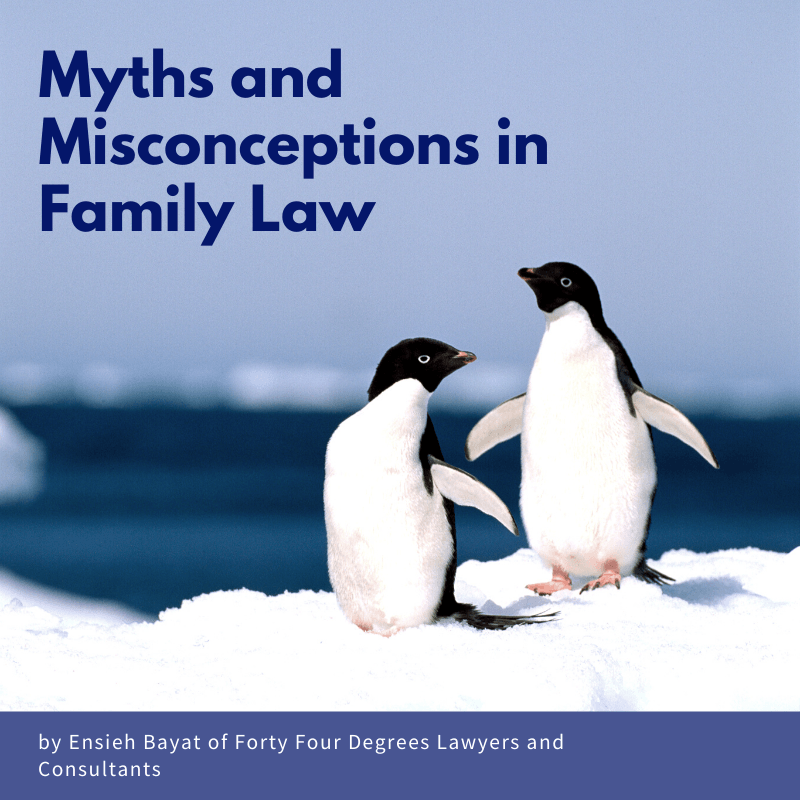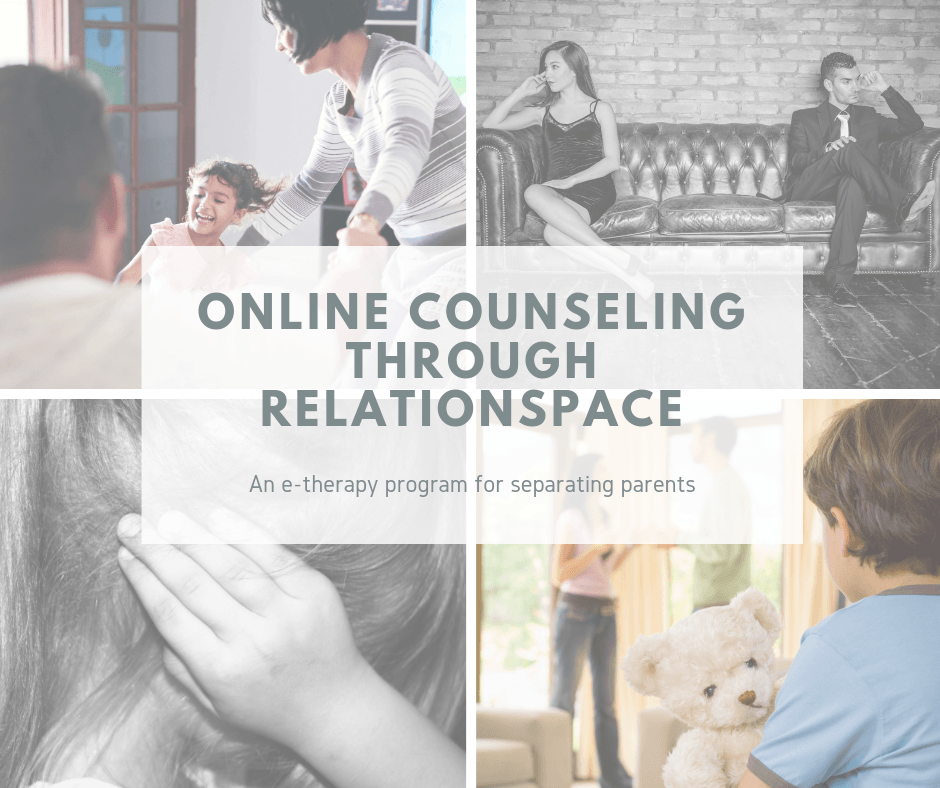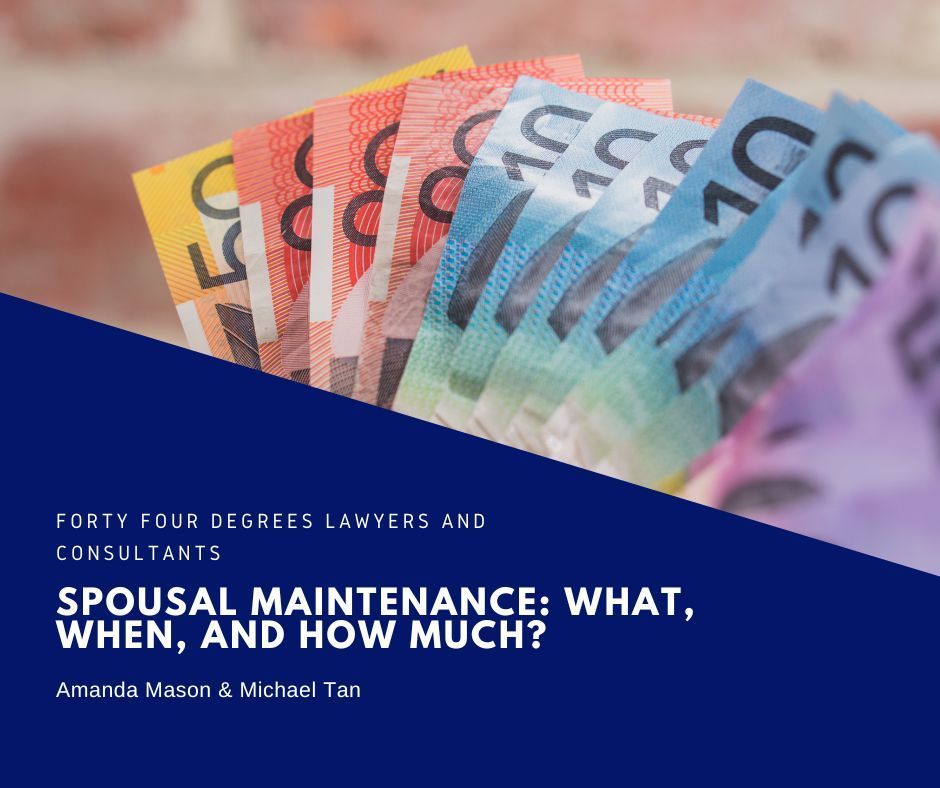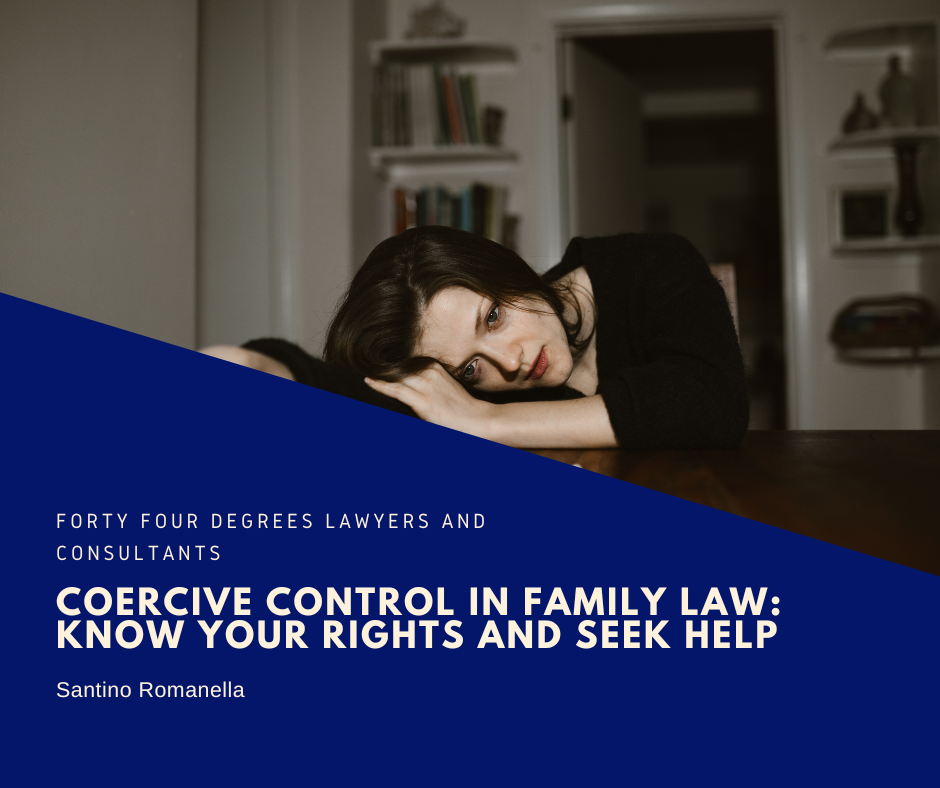Family Law
We know there are some truths in life; children are resilient and yet fragile, families are complex, and at any point that you need to speak to a lawyer, you probably don't want to. We get it.
Our team is here to help you through this difficult time. Our approach is always to put you and your needs first. To listen. To help you work towards the outcome that will let you get back to the things that are truly important; family.
We assist with a range of family law matters, including divorce applications, children and property settlements, binding financial agreements, family violence issues and more.
Guides
Family Law Guide
Family Violence Intervention Order
Family law topics
Parenting
One of the focuses of our firm is helping people parent better. We are teaming up with online counselling services that offer access to tools that allow you to cope in times of high conflict. When you talk to us today, ask about the online counselling service.
Learn More
Divorce
Get Started
Australia has a no-fault divorce system.
Parties can apply for divorce (the official court process that ends the marriage) jointly. More commonly, one party applies for divorce and the other party is served with documents.
Often no court appearance is required as Australia has a no fault divorce system. If you can prove that you have been separated for more than 12 months, then all we have to do is serve (yes, just like on TV) the divorce application on the other side.
If you have children under the age of 18 then you (or more likely, us) will need to go to court and assure them that adequate provisions for the child have been made.
Violence
What to do when things are not safe at home
If you are in danger call 000. Your personal safety and the safety of others is paramount.
In circumstances of family violence, it is important to remember that there are many services available to you. One of those is WIRE
- a service dedicated to referring women, nonbinary and gender-diverse people to the services that they need.
Family violence intervention orders can be obtained through the Victorian Police or the Magistrates' Court. Some Courts allow you to apply for a Family Violence Intervention Order (an IVO) online and afterhours.
Updates in Family Law

By Ensieh Bayat
•
13 Feb, 2020
“What is the difference between a divorce and a property settlement?” A divorce is the end of the marriage; it is the termination of a legal relationship. A property settlement, on the other hand, is a process that allows for the division of matrimonial assets. Often we talk about these two things together, but they are separate processes. “Can I post about my divorce or separation on social media?” The short answer is; not until everything has been finalised. We understand that most people (us included) use social media to share news about their lives with their friends and family (e.g. New baby, engagement, travel and most recently divorce). It can be very tempting to show everyone, especially you ex-spouse, that you are doing well and you are much better off without them. Unfortunately, sometimes these posts can be used to the detriment of your property division and, in more extreme cases, parenting arrangements. You spouse can argue that you are using money from the joint asset pool to fund your new lavish lifestyle, that you are ruining their reputation in the community and in some cases, you are neglecting the children. In these cases, we would have to prove to the court that these statements are not true and doing this can be costly and time consuming. We therefore recommend that you not post anything on social media until everything, including property division and parenting arrangements, have been finalised. We do however recommend that you let your close friends and family members know early on. Divorce can be a difficult time and you will need all of their support to get through this. You can inform them using group chats, phone calls and even the traditional face to face conversation. “What are disclosure documents?” “Why do I have to do submit all of these financial documents?” Duty of disclosure requires all parties to a family law dispute to make full and frank disclosure of information to each other party all information relevant to an issue in the case. This includes information recorded in a paper document or stored by some other means such as a computer storage device and also includes documents that the other parties may not know about. The duty to disclose in family law applies in both parenting matters and financial disputes. Failure to provide disclosure or providing false or misleading information, can result in the Family Court making final orders that are not fair, just or equitable or orders pertaining to parenting arrangements that are not in the best interest of the children. Failure to provide full and frank disclosure may also lead to being found guilty of contempt of court for non-disclosure or for breaching an undertaking as to disclosure. The court could impose a fine or a term of imprisonment for contempt of court. For financial matters, the duty to disclose relates to any information as to earnings, interests, property, or any other financial resources to which a party has access whether directly or indirectly. This can include but is not limited to: Details of assets that you own or are in your possession including valuations or appraisals of these assets; Copies of Pay slips, Group Certificates and/or Centrelink statements; Copies of tax returns, estimates or assessments; Copies of statements from any of your bank, building society and/or credit union accounts; Copies of statements from any credit card/s and any loans; Superannuation statements; and Details or interests in any company and/or trust and supporting documentation. Parties are also required to disclose information relating to the disposal of any assets, if the disposal occurred during the year prior to separation or since separation. This includes items sold, transferred, assigned or gifted as well as any items purchased with funds acquired from the disposal of the asset. More information is available in our Duty of Disclosure guide . “We were married overseas, can I get a divorce in Australia?” If you were married overseas you may still be entitled to apply for a divorce in Australia. In order to apply for a divorce one of the parties must: Regard Australia as your home and intend to live indefinitely in Australia; OR Be an Australian citizen by birth or descent; OR Have been granted Australian citizenship; OR Ordinarily live in Australia and have lived here for at least the last 12 months. “When can I start using my maiden name again?” You can use your maiden name at any time, even when you are married. If there are any legal documents that you wish to change, most organisations have a simple process where you can change your details for future references. “When can I get married again?” Once the court has granted you a final Divorce Order (the “Decree Absolute”), you are able to get married again. “I want everything/ I don’t want to give them a cent and I think that is fair so I going to take this matter to court.” Property proceedings can be messy and emotionally charged. Parties in such a proceeding think this is their last chance to “fight”, stand for their rights, or make the other person suffer. What we emphasise to our clients is that neither party is going to leave the process entirely satisfied. Both sides will inevitably compromise on a point that they did not want. So, we always encourage our clients to settle for what is “equitable” rather than what they perceive to be “fair”. This is not to say that you should give up or be fearful that going to court is detrimental. Legal advice is unique to each individual and we suggest you speak to us about your particular situation. Good legal advice will help you maintain perspective about what is worth pursuing and what is not. Ensieh Bayat is a family law solicitor at Forty Four Degrees practicing in family law, criminal law, wills and estates, and employment law.

By Nick Tzimourtas
•
13 Feb, 2020
Whilst the first Family Court practice direction of 2020 simply repeated and highlighted a range of principles which had already been establish in previous legislation (such as the Family Law Act 1975, Family Law Rules 2004 and Federal Circuit Court Rules 2001), the second practice direction of 2020 may be a game changer. The second practice direction of the Family Court has been made in an effort to further streamline family law matters and ease the flow of matters in the Federal Circuit Court of Australia. Just as the introduction of the Federal Circuit Court was revolutionary in easing the load of overflowing contentious matters in the Family Court, the introduction of the Priority Property Pool under $500,000 Cases (“PPP500 Cases”) list hopes to further hasten matters of which the total property/asset pool of a family law matter is under $500,000 (as the name would suggest). In providing people with a separate list which caters to the requirements and needs of matters meeting this standard, people will hopefully be provided a faster, more equitable and just outcome. Ultimately, this priority list will aid parties in identifying and narrowing the issues in dispute and assisting the parties to undertake: o Alternative Dispute Resolution (ADR) at the earliest opportunity; and o In the event ADR is unsuccessful, providing the parties an opportunity for a less adversarial trial or a hearing on the papers. Conditions to establish your matter as a PPP500 case For a matter to be heard as a PPP500 case in the Federal Circuit Court, the following requirements are to have been met: 1. The Family Law Initiating Application is to be filed after 1 March 2020 in one of the jurisdictions of Brisbane, Parramatta, Adelaide or Melbourne. The Family Law Initiating Application must also invoke the jurisdiction of the Federal Circuit Court of pursuant to the Family Law Act. 2. The value of the net property of the parties and inclusive of the superannuation interests is under $500,000; and 3. There are no entities in the effective control of either party, such as a family trust, company, or SMSF, that will require a further valuation or expert report; or 4. The Court makes a declaration or notation that the case is designated as a PPP500 case. The following cases cannot be designated as PPP500 cases: a. cases where parenting orders are sought; b. cases where parenting and financial orders are sought together; c. Child support cases; d. Child maintenance cases; e. Contravention applications; and f. Enforcement applications. Initiating a PPP500 matter Approaching your lawyer to initiate a PPP500 matter should definitely be your prerogative if you meet the above criteria. In the preparation of a PPP5000 matter, certain elements of the Federal Circuit Court Rules are partially suspended. In particular, the requirement to file an Affidavit and Financial Statement is waived until: 1. The Court directs a party to file an Affidavit or Financial Statement; or 2. ADR fails and directions requiring the filing of an Affidavit and Financial Statement are made for trial. If the net property of the parties including any superannuation interests is under the sum of $500,000, then the party wishing to initiate proceedings is to file an Initiating Application (Family Law), and a PPP500 Financial Summary. It is then at the discretion of the Court to determine whether a matter be listed as a PPP500 case. It should also be noted that even if a party does not indicate that a matter is to be listed as a PPP500 case, the Court may still list the matter as such if the circumstances meet the criteria as such. The Court may also designate an existing matter listed as a PPP500 case, if the parties have not attended the first trial date yet. In this instance, a direction may be made by the Court for the parties to file a PPP500 Financial Summary, exchange financial documents, and any further matters of civil procedure. This practice direction takes effect from the date that it is issued and, to the extent practicable, applies to all PPP500 cases filed on or after 1 March 2020. Nick Tzimourtas practices family law, wills and estates, and criminal law matters at Forty Four Degrees and is able to assist clients in Melbourne CBD, and Dandenong CBD.

By Nick Tzimourtas
•
16 Jan, 2020
What are they? Much like the ‘restraining orders’ we hear about on American television programs, an Intervention Order (IVO) is essentially a court order to help protect you and your family from the threat of violence, or from anyone who makes you feel unsafe. Whilst an Intervention Order is specifically relevant to Victorian Courts, with other state jurisdictions having their own version of a restraining order (e.g. the Apprehended Violence Order in NSW), the Intervention Order and its counterparts are enforceable throughout the entirety of Australia. There are two types of Intervention Orders that can be applied for in Victoria: 1. A family violence intervention order 2. A personal safety intervention order Both of the above Intervention Orders practically establish the same level of safety and are relatively similar. The main difference being the relationship between the affected person and the person you are applying for protection from. If the person you are seeking protection from is a family member, including ex-spouses in family matters, then we would arrange for you to make a family violence intervention order. What can an Intervention Order do? If you or an immediate family member has been the subject of harmful behavior, are there is the reasonable threat that this harmful behavior will continue, then applying for an intervention order will establish a court-ordered mandate of safety for yourself and your loved ones. Each Intervention Order is different based on the level and what type of harmful behavior has been occurring, including both physical and psychological harm and harassment. An Intervention Order has the power to protect you and your loved ones from harassment, stalking, threats, and intimidation. This is often done through the court ordering that a person is not allowed to contact the protected party in any way, and also not allowed to be near the person or their place of residence. Typical conditions imposed include: committing family violence against the protected person intentionally damaging the protected person’s property or threatening to do so attempting to locate or follow the protected person or keeping them under surveillance publishing on the internet or by email or other electronic communication any material about the protected person contacting or communicating with the protected person by any means approaching or remaining within a certain distance of the protected person going to or remaining within a certain distance of where the protected person lives, works or attends school or childcare getting another person to do anything the respondent must not do under the order How can a lawyer help? Our office boasts a number of lawyers with expertise in family law and violence related intervention orders. Our team can provide legal advice, assist with the application, and attend court hearings. It is appropriate for both the applicant and the respondent to have a lawyer attend on their behalf as complicated interpersonal issues often benefit from forensic analysis. If you have been served with an application for an intervention order, you ought to get advice as to how best to respond to the application. What next? For more information or to have a chat, please contact us on 1300 892 237. Nick Tzimourtas is a lawyer at Forty Four Degrees focusing on family law, wills, probates, estates, and criminal law.

By Ensieh Bayat
•
09 Jan, 2020
MYTH: I can't get divorced until I move out. You do not need to move out of your place of residence in order to be separated. You can be separated even when you are living “under the same roof” but there has to be a clear division of your everyday activities, bill payments, sleeping arrangements etc. As long as you are able to prove that there was an “irretrievable breakdown of the marriage”, then you will be able to file for divorce within 12 months from date of separation. MYTH: Once we separate, my spouse will be entitled to half of our assets. A 50/50 settlement is the starting point, but the asset division depends on the parties overall financial and or non-financial contribution to the relationship and their future needs. There are a number of factors that the Court takes into consideration when determining how assets should be distributed after the breakdown of either a marriage or de facto relationship pursuant to the Family Law Act 1975 . Some of these factors include: 1. The length of the relationship; 2. Each party's age and health; 3. Whether there are children from the relationship; 4. The non-financial contributions of either party; 5. The current and future needs of either party; 6. Whether parties had assets before the relationship started; 7. Whether one or both parties made special contributions during the relationship, such as receiving an inheritance, gift of money or possibly a compensation payment; and 8. How much time the children might spend with their respective parents after separation. MYTH: I have to wait until I am divorced to have a property settlement. You do not need to wait until you are divorced. In fact, in most cases, we recommend that parties negotiate and formalise their property settlement before applying for a divorce. The twelve month wait period does not apply to a property settlement. MYTH: “I can see my child anytime” or “I am entitled to 50/50 child custody” Even though there is a presumption that parents should have equal shared parental responsibility for their children, this might not always be the case. As per Family Law Act 1975, the child’s best interest is the paramount consideration when the Court makes parenting orders. This means that if the Court finds that is not in the child’s best interest to spend equal time between their parents or it is not practicable for that to occur, then an Order would be made to reflect as such, which may minimise a parent’s time with the child. Please note that it is the child’s right to have a meaningful relationship with both parents, to the maximum extent consistent with the best interests of the child. Therefore, Parenting Plans or Court Orders would be made in order to Facilitate this. MYTH: There is no need for a lawyer. Thanks to the digital age, we have become quite accustomed to “do-it-yourself” guides and online resources to help solve our problems. We have noticed that more and more people are unrepresented in the Family Law courts. Unfortunately, not seeking legal advice can be detrimental to your matter. Lawyers are able to; 1. Maneuver the complexity of law; 2. Take away the stress of handling the matter as well as the emotional turmoil; and 3. Negotiate a better outcome for you or a favourable outcome for all all parties involved. Whilst some may be capable of representing themselves at court, having a lawyer can often provide a better, faster, more economical, and lower stress outcomes for you.
Frequently asked questions
Are prenups worth the effort?
We are often asked if Binding Financial Agreements work or if they are worth the effort. Yes. Like anything in life, they are only as good as the time and precision you put in them. Our principles, those of integrity and fairness, underpin each Binding Financial Agreement.
There is nothing simple or rote (or problematic) about putting pen to paper and discussing with your partner the financial circumstances of your relationship, and having a good lawyer on your side as part of that conversation can make all the difference. Instead of adversarial, it becomes advisory.
The inventory of assets and liabilities of each partner that form such an important part of a BFA is a kind of agreed understanding about the existence and value of certain items. Should things go wrong or complicated (in both the literal and the Facebook sense), it is important to have a document to turn to that reminds us of a time when we did in fact agree.
How does division of property work?
What forms the asset pool? All assets of the parties in the relationship form the asset pool including the matrimonial home, investment properties, shares, superannuation, etc.
Then what happens? Once we establish what the asset pool is, we look at how that pool is to be split between the parties to take into account the contributions and circumstances of the parties.
The law that governs property matters is the Family Law Act 1975 (Cth)
To get more information about the duty of disclosure, download our guide here.
What are the laws on surrogacy?
Surrogacy is an arrangement (often supported by a legal agreement), whereby a woman agrees to become pregnant, carry, and give birth to a child on behalf of another person, via artificial insemination, and return the baby to the intended parent(s) upon birth.
Surrogacy frequently asked questions are available here.
Contact Us
We’re an Australian Law Firm promoting a nuanced, personal touch. We have the skills you need to resolve your case quickly and with a positive outcome. Our straight talking team stays close to simplify what is most often a complicated process. We help individuals and businesses with technology and startup law, property law including conveyancing and leasing, commercial law, civil litigation, wills, estates, bankruptcy, insolvency, criminal law, and professionals facing investigations and charges from their regulatory body.
We have a connected network of talented lawyers in Melbourne CBD, Dandenong, Ballarat, and Ivanhoe East.
Fill out the form or call us on 1300 892 237.
Thank you for contacting us.
We will get back to you as soon as possible
We will get back to you as soon as possible
Oops, there was an error sending your message.
Please try again later or call us on 1300 892 237.
About Us
We do business your way.
203/ 50 Market St, Melbourne VIC 3000
50 Lydiard St South
Ballarat Central VIC 3350







